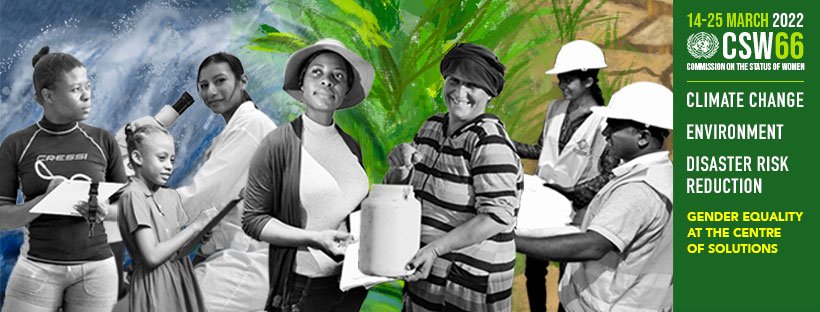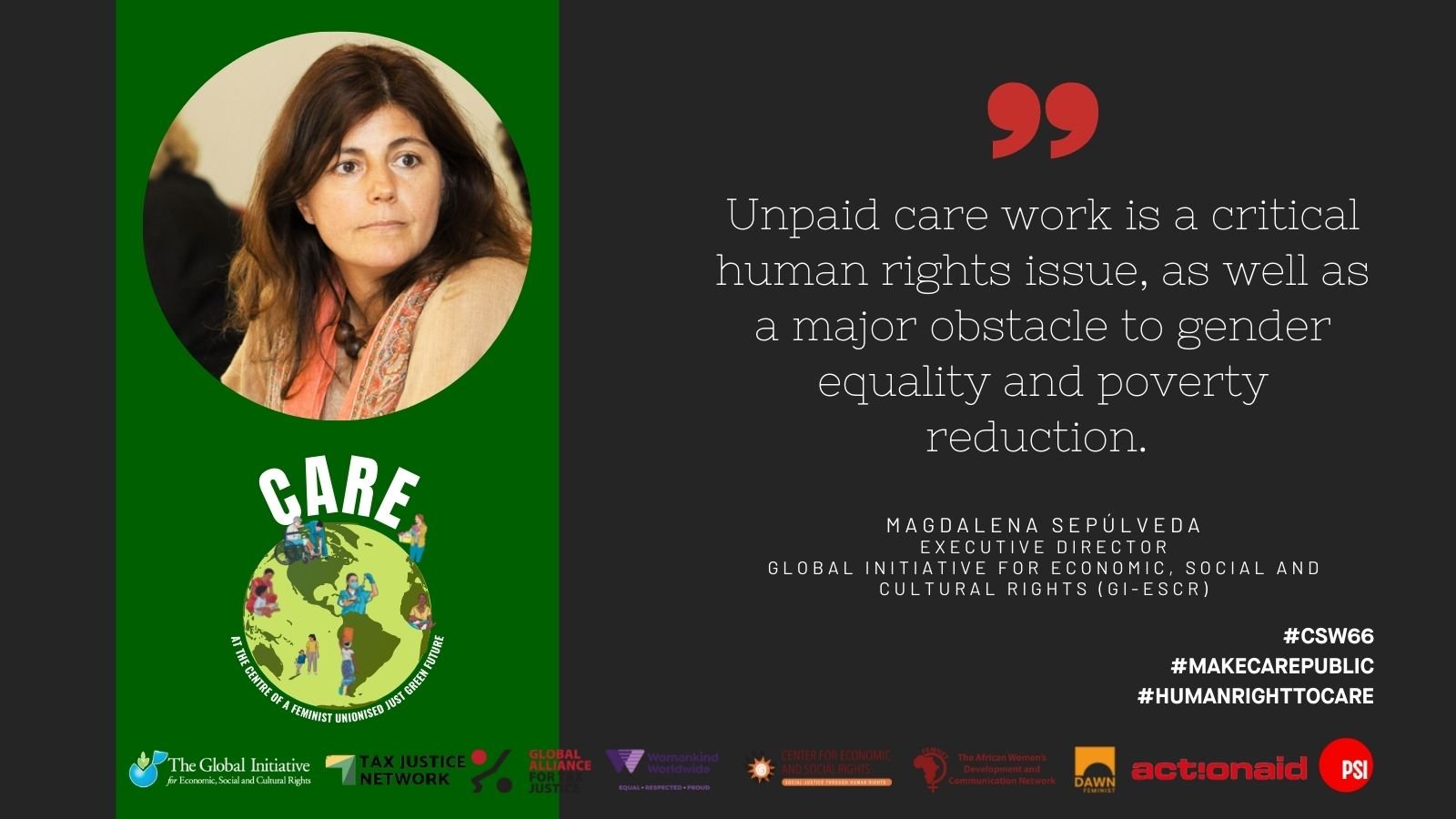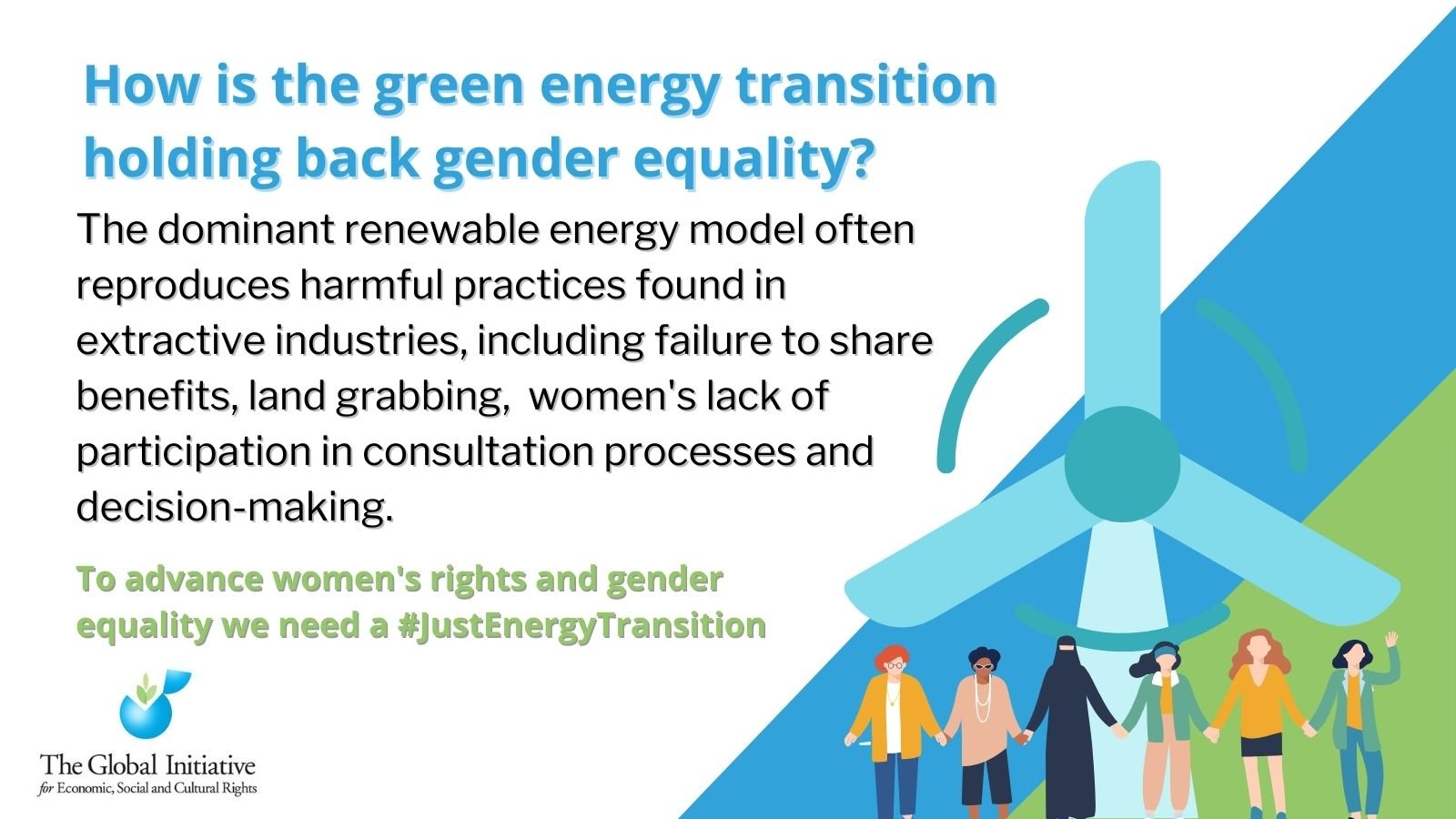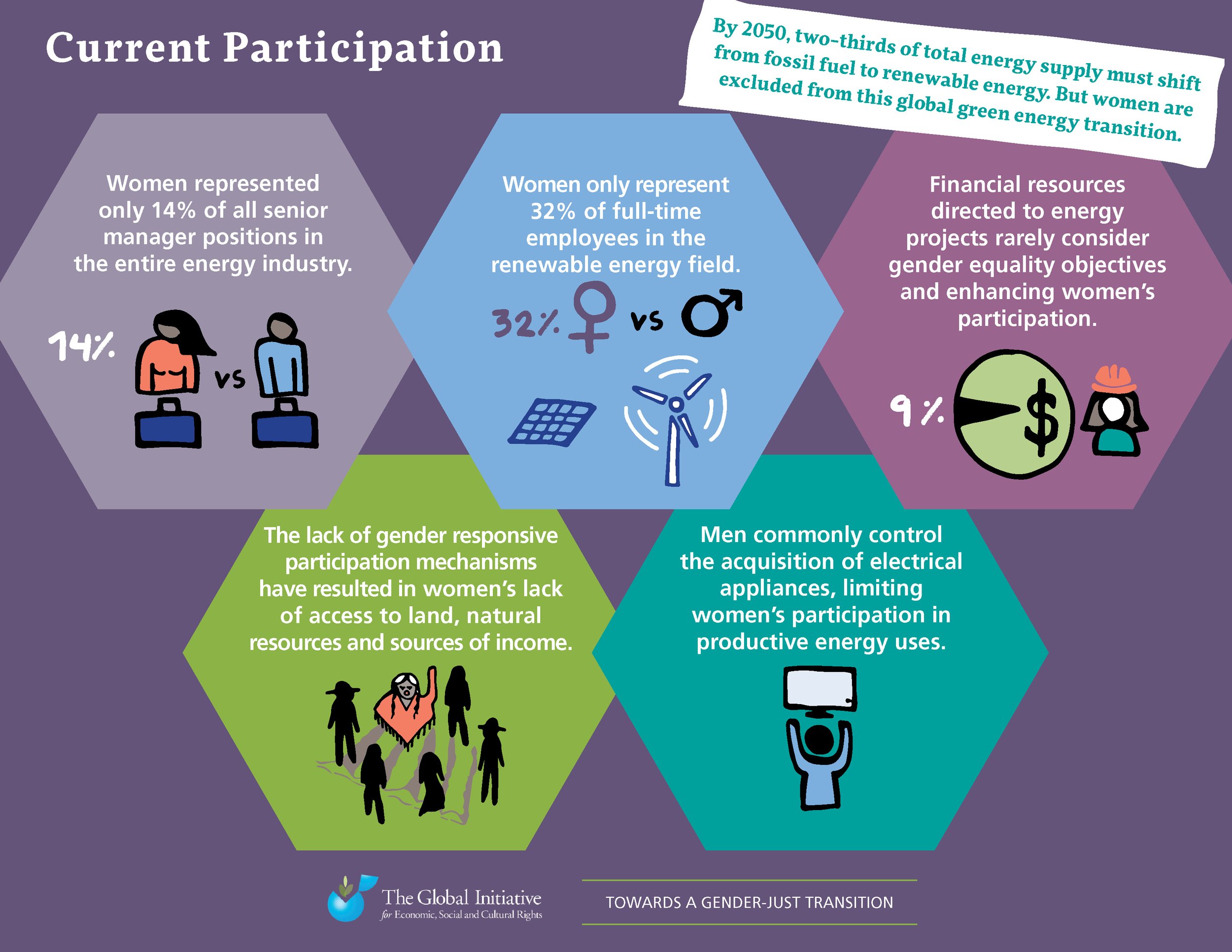On the Ground
Explore our work with partners, globally and locally, to tackle social and economic injustice using a human rights lens.

CSW66 adopts new standards for achieving a feminist energy transition
CSW66 adopts new standards relevant for achieving a feminist energy transition
Last 25 March the 66th session of the Commission of the Status of Women (CSW66)—the most important UN global forum for women’s empowerment and the achievement of gender equality—concluded with the adoption of the Agreed Conclusions on the thematic priority theme: “Achieving gender equality and empowering women and girls in the context of climate, environment and disaster risk reduction policies and programmes”.
Building on the Beijing Declaration and Platform for Action, which since 1995 recognizes the interlinkages between women’s rights and the environment, the CSW66 provided for the first time a critical space for stakeholders traditionally engaged in the advancement of women ‘s rights and gender equality to connect and build synergies with those focused on climate action, environmental protection, and disaster risk reduction policies and programmes. The imperative that climate, environmental protection and response to disaster cannot be achieved at the expense of women’s rights and that neither can the advancement of gender equality be possible at the expense of ecosystems was placed at the centre of this year’s discussions at the CSW66. The Agreed Conclusions—the outcomes document reflecting the international consensus on the thematic priority theme— contributed to bridge the gaps between the feminist and environmental agendas and set standards on the need to undertake decisive and comprehensive solutions simultaneously addressing gender and environmental concerns.
The CSW66 Agreed Conclusions thus provide an important roadmap to move forwards with the decarbonization of our energy systems and drive a green energy transition rooted in human rights and gender equality principles. We briefly analyse the Agreed Conclusions highlighting some of the positive developments as well as some key missed opportunities to advance a feminist energy transition. Other critical elements covered by the Agreed Conclusions on climate change, environmental degradation and disasters are not addressed on this brief note. This is not intended to be an exhaustive analysis but rather a targeted review of the most relevant standards adopted on a gender-just energy transition.

-
Access to sustainable energy to reduce, redistribute and revalue unpaid care and domestic work
One of the most relevant issues addressed by the Commission was in relation to the need to socially reorganize care systems and the impact of the environmental emergency in increasing care burdens shouldered mostly by women and girls. The Agreed Conclusions recognized that “women and girls undertake a disproportionate share of unpaid care and domestic work, which can be exacerbated by climate change, environmental degradation and disaster, limits women’s ability to participate in decision-making processes and occupy leadership positions, poses significant constraints on women’s and girls’ education and training, and on women’s economic opportunities and entrepreneurial activities (para. 47).”
To address these structural conditions of gender inequality, the CSW underscored the relevance of recognizing and adopting “measures to reduce, redistribute and value unpaid care and domestic work by promoting the equal sharing of responsibilities between women and men within the household and by prioritizing, inter alia, sustainable infrastructure “(para. 47). In this line, access to sustainable infrastructure, according to the Agreed Conclusions, involves fostering investments in “(…) energy, transport and information and communications technology, and other physical infrastructure for public services” (para. 49 ).
Ensuring women and girls access to sustainable infrastructure, including on renewable energy, is critical to address women’s and girl’s chronic time deficits created by increased unpaid care and domestic work burdens. In this sense, new clean, renewable energy systems need to recognize and contribute to diversify the roles women and girls play within their families and communities to redistribute care and domestic work and progressively help transform uneven gender power imbalances.

-
Supporting a gender-responsive transition to low-carbon energy systems
The CSW made an important statement specifically in relation to the transition to decarbonized energy systems. The Commission acknowledged the need to “support and finance gender-responsive, equitable and sustainable transition towards low-emission energy systems, including by rapidly scaling up the deployment of clean power generation and energy efficiency measures, that work for all people and the planet, taking into account the potential of ecosystem-based approaches or nature-based solutions with gender-sensitive and age-inclusive social protection and care at the centre (para. uu).” States, therefore, recognized that the shift towards renewable, clean energy systems need not only to be swift and deployed at a scale, but should also place care and the needs of historically marginalized groups, including women and girls, at the heart of the energy transition. Furthermore, mainstreaming renewable and energy efficient technologies should be conducted in tandem with the implementation of measures to protect and restore local ecosystems, as well as to ensure the expansion of gender-sensitive social protection systems to protect groups in vulnerable conditions, while reducing the potential environmental impacts of renewable energy projects.

-
Financing the energy transition
In relation to the critical question on increasing gender-responsive finance of climate, environmental and disaster risk reduction policies, which include the shift towards renewable energy and energy efficient technologies, the Commission stated the overarching goal of “scaling up technology transfer, capacity-building and the mobilization of financial resources from all relevant sources, including public, private, national and international resource mobilization and allocation” (para. u). It, furthermore, urged developed countries to fully implement their respective official development assistance (ODA) commitments (para. v), and the need to mobilize climate finance from all sources to reach the level needed to achieve the goals of the Paris Agreement, including significantly increasing support for developing countries, beyond the Glasgow Climate Pact envisaging USD 100 billion per year (para. y). Most notably, the agreed conclusions underscored the importance of increasing “public and private financing to women’s civil society organizations, including young women’s, girls’ and youth-led organizations, feminist groups, and women’s cooperatives and enterprises for climate change, environmental and disaster risk reduction initiative (aa). This latter point is of special relevance as it is often the case that women face structural barriers to access finance for the development of bottom-up, community-led sustainable energy solutions that have greater opportunities to be responsive of women’s local needs that large-scale energy projects.
Despite these important references to climate finance, the Commission failed to recognize the need to develop a progressive fiscal policy as an essential tool to finance the energy transition. This is a significant omission as fiscal policy is one of the most critical tools available to States to ensure those who have historically contributed to the climate crisis and are currently polluting more, are also those who pay for a more significant share of the shift towards clean renewable energy and the provision of safe, reliable, and accessible sustainable energy services for all. A progressive fiscal policy should also combat tax evasion and tax cuts for high profit-making corporate actors, particularly of those engaged in the extractive fossil fuel industry. Moreover, the reference on the elimination of subsidies for the fossil fuel industry was also one of the key elements missing in relation to climate finance. All these critical public resources need to be channelled towards investments in rights-aligned and gender-equal sustainable energy solutions with multiplying positive effects to advert the climate emergency and the reduction of inequalities.
-
Women’s participation in the management of energy resources
In relation to women’s full and effective participation, CSW66 Agreed Conclusions emphasize the need to promote a “gender-responsive approach and the full, equal, effective and meaningful participation of women in decision-making and leadership of women and, as appropriate, girls in (…) household energy management in the context of climate change, environmental and disaster risk reduction policies and programmes, and take measures to reduce the time spent by women and girls on collecting household water and fuel and protect them from threats, assaults and sexual and gender-based violence while doing so (…) (para. t). This reference is critical as it well-known that women across the world are often responsible for collecting biomass to be used as fuel for cooking, lighting and heating in low-income households with no access to safe, reliable, accessible energy services. In this context, however, it should be noted that is not only necessary to ensure women’s participation and leadership in the management of household energy, but also of energy used to power other critical productive activities, such as agriculture, industry and manufacture. Women’s access to and control over energy resources should not be reduced only to the household level. This may risk further entrenching pre-existing gender roles that do not recognize women’s contributions to key sectors of the economy, such as small-scale farming and food production, and that limit women’s participation in other relevant sectors of the economy. Furthermore, energy management should be considered in tandem with access to energy efficient technologies. The acquisition and use of energy efficient technologies capable of transforming energy access into productive energy uses is gendered and women tend to have limited decision-making power over technological devices at the household and community levels.

-
Gender-responsive, just transition
CSW66 agreed conclusions also provide new standards that help ground some key elements of a gender-responsive just transition—a essential framework to drive a feminist energy transition. In this context, the document states it is imperative to “protect and promote the right to work and rights at work of all women and ensure the equal access of women to decent work and quality jobs in all sectors, such as sustainable energy (…), by eliminating occupational segregation, discriminatory social norms and gender stereotypes and violence and sexual harassment, supporting the transition from informal to formal work in all sectors, ensuring their equal pay for work of equal value, protecting against discrimination and abuse and ensuring the safety of all women in the world of work, and promoting the right to organize and bargain collectively to advance, as well as access to sustainable livelihoods, including in the context of a just transition of the workforce (para. vv).” This is an important reference for the protection of women’s right to work in all industries key to the transition to a low carbon economy, including in the male-dominated energy sector. Most retraining and transition frameworks directed to the workforce of the fossil fuel industry only target male workers and fail to provide opportunities for women who are overrepresented in administrative positions and in secondary services in the energy sector. However, the Commission failed to adopt a more broader vision on just transitions to encompass the need to embed human rights and social justice principles in climate, environmental and disaster reduction policies and programmes.
The Commission also acknowledged for the first time “that natural resources and ecosystems and women’s labour are treated as infinite and are undervalued in the current metrics of economic growth, such as GDP, despite being essential to all economies and the wellbeing of present and future generations and the planet (para. 38)” This statement help question current development pathways based on uneven unpaid care and domestic work and endless economic growth requiring ever increasing and unsustainable energy demands. Shifting away from GDP growth as a metric to measure economic prosperity and well-being and fostering a rights-aligned and care-based economic system is essential to foster just and sustainable energy consumption and production patterns that prioritize the needs of the most marginalized. This reference is important to harness efforts to shift the narrative on the dominant economic model and ensure peoples and communities have access to energy resources, while adverting the overshoot of planetary boundaries.
There were several missed opportunities to push for the unprecedented, deep, and structural measures needed to advance a feminist energy transition. Women’s rights and feminist organizations voiced their concern on CSW66’s failure to reflect the small window of opportunity we have to take decisive action and significantly reduce our dependency on fossil fuels. Considering we have a decade to halve our global emissions, Agreed Conclusions seem to fall short of the sense of urgency needed to be imprinted in relevant standards to advert the planetary crisis.
Furthermore, Agreed Conclusions failed to question the gender and human rights implications of large-scale development projects, which include renewable energy infrastructure projects and other green projects, which are frequently carried out without environmental and social safeguards, socializing the costs, and failing to distribute the benefits with local populations. These large-scale development projects often result in disproportionate impacts on indigenous, labour, community, and land rights. As they tend to be land-intensive, these projects may result in limited access to natural resources, land and territories and may pose risks to the health and safety of local populations, with disproportionate impacts on local women and girls. It is thus imperative to further develop standards to advert the risks posed by mega development projects, including those related to green energy infrastructure and the extraction of minerals necessary for the development of low-carbon technologies. To ensure a gender-just transition, we need to ensure these projects are carried out in compliance with international human rights.
Further references on the need to foster democratic participatory and cooperative forms of energy governance and the recognition of the role of sustainable energy services in combating poverty and building the resilience of communities to the impacts of the planetary crisis was also one of the critical elements missing in this year’s CSW Agreed Conclusions.
-
Civil society engagement
Due to COVID 19 restrictions, this year many women’s rights and feminist civil society organizations were not able to participate at CSW66. In recent years, spaces for civil society engagement have been shrinking significantly imposing barriers for women’s rights organizations to voice their concerns and inform key international fora about women at the ground. We thus call on member States to ensure civil society organizations and women in all their diversity, especially those most adversely impacted by the planetary crisis, can timely, effectively, and meaningfully participate at CSW. To push for a gender-just and sustainable future, it is imperative that key standards on women empowerment and gender equality are informed by and are responsive to the needs, experiences and demands of women at the frontlines of the response to the planetary crisis.
We encourage you to read the full text for a more comprehensive appraisal of other key issues addressed by the CSW66! And here you can learn more about our work on Renewable Energy and Gender Justice.




